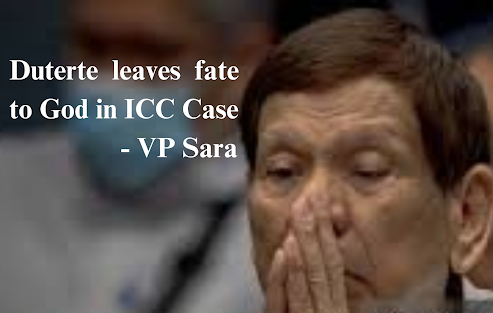SWS: 51% agree, 25% disagree Duterte should be held accountable for killings – GMA News Online
Imagine walking into a bustling Jollibee for breakfast, where twenty Filipino customers enjoy their meals. You pose a single question to each of them: “Do you agree that Duterte be held accountable for his killings?” Ten nod in agreement, five shake their heads in disagreement, and the remaining five remain undecided and with no opinion. These numbers, drawn from the latest SWS survey, paint a vivid picture of a nation divided. For the five who disagree, the arrest and detention of their beloved Tatay Digong by the International Criminal Court (ICC) in the Hague is not just a legal matter – it is a profound emotional crisis akin to personal loss.
Psychiatrist Elizabeth Kübler-Ross introduced the groundbreaking five stages of grief - denial, anger, bargaining, depression, and acceptance. Originally developed to understand the emotional journey of terminally ill patients, this framework has since been applied to various crises, including loss and trauma. For Duterte Diehard Supporters (DDS), Kübler-Ross’s model offers a lens for understanding their reactions to this seismic event. Each stage of coping reveals a distinct emotional response, providing valuable insights into the human capacity for adaptation and healing in the face of adversity.
Let us delve into these varied reactions, stage by stage:
Denial: “No proven evidence,” “Testimonies are scripted,” “They’re paid to ruin Duterte.”
In this initial stage, denial acts as a protective shield. DDS struggle to reconcile the accusations with their image of Tatay Digong. The disbelief and insistence that he could not have committed crimes against humanity reflect the emotional intensity of this stage, allowing them to avoid confronting the painful reality temporarily.
Anger: “Lam lam! (Nonsense!)”
Here, anger is directed outward, targeting external forces such as the media, the current administration, or anyone with an opposing view. This reaction serves as a coping mechanism, redirecting frustration to preserve loyalty and protect the image of their leader. This anger is less about the facts and more about the perceived injustice of the situation.
Bargaining: “It’s political!” “It’s kidnapping!”
Bargaining emerges as an attempt to regain control and make sense of the crisis. Clinging to conspiracy theories or alternative narratives, supporters seek to absolve Duterte, using these explanations to cope with uncertainty and guilt.
Depression: “Let us pray for him.”
This stage reflects a sense of resignation and powerlessness, intertwined with deep sadness. Supporters feel emotionally drained and defeated, and their hope for change is dimmed. The weight of the crisis bears heavily on their well-being, leaving them in a state of quiet despair.
Acceptance: “Thank you.”
Acceptance marks a turning point, where the harsh sting of reality no longer paralyzes but fosters clarity and resolve. This stage combines an acknowledgment of accountability with hope for spiritual healing. It reflects an understanding that justice is necessary, yet it also embraces the possibility of growth and repentance - a balanced perspective on moving forward while holding onto hope.
At first glance, “Thank you” might seem like a pat on the head or simple expression of gratitude. One reader commented: “Once you start, you can’t stop reading.” Another one even messaged privately: “You are truthful but also compassionate. Fact-based but you appeal also to an invitation of values and truth which is palatable to both sides of this issue.”
Yet, this “Thank you” transcends its surface meaning. It speaks to a deeper truth – one that echoes in the excruciating cries of families who lost loved ones to extrajudicial killings. Their pain is raw, their words unspeakable: “Sana mamatay ka.” “Sana mabulok ka sa piitan.”
But there is another truth, one found in the words of Jesus: “You will know the truth, and the truth will set you free.” John 8:32
This truth is echoed in Ezekiel 18:21-23, where God declares that He takes no pleasure in the death of the wicked but rejoices when they turn from their ways and live.
For the thousands of families of victims like Kian, the 17-year-old boy who pleaded for his life to the police before being shot: “Tama na po, may exam pa ako bukas,” or, the father killed at seven in the morning in front of his daughter’s elementary school, this divine mercy may feel like an unfair privilege for Duterte. Yet, as in the parable of the prodigal son, God’s mercy surpasses human understanding of fairness.
The Catholic Daily Reflection illuminates this perspective:
“When it comes to the mercy of God, God’s generosity and goodness far exceed what is perceived as fair. And if we are to share in the abundant mercy of God, we too must learn to rejoice in His superabundant mercy.”
At this point, “Thank you” becomes a consecrated “Thank you, Lord” offering by the DDS to the One who truly deserves it.
Acceptance, then, is not merely about coming to terms with the past – it is about embracing justice as a path to moral balance and kindling hope for spiritual healing. It is a stage that transcends individual grief, offering redemption not only to DDS but to all Filipinos, including Duterte himself.
Even Vice President Sara Duterte seems to have reached this Acceptance stage when she declared: ”Sabi niya, ‘Ipapasa-Diyos ko na yan lahat. Kung anong mangyari sa buhay ko, so be it’.” May this serve as a guiding light for DDS, leading them not only toward justice but also toward the redemption that, by God’s grace, can heal our beloved Philippines.
Picture this: a lively morning at Jollibee, the aroma of freshly brewed coffee mingling with the chatter of twenty Filipino customers. You approach them with a single question: “What is your reaction to today’s headline – Duterte dedicates his life to God inside his cell at The Hague?”
The room falls silent, not out of disbelief, but out of a shared sense of awe and reflection. Some smile faintly, moved by the possibility of redemption; others nod solemnly, acknowledging the profound weight of accountability met with grace.
In that moment, the bustling restaurant becomes a microcosm of a nation beginning to heal – where justice and mercy intertwine, and hope for spiritual renewal transcends the divides of the past.
Content & editing put together in collaboration with Bing Microsoft AI-powered Co-pilot
Head collage photos courtesy of The Japan Times, gettyimages, New Straight Times, ICC, Philstar, Dreamstime, & Canva
Still photos courtesy of Pexels, Poem Hunter, Theatrical release poster, A-Z Quotes, gettyimages, & Dreamstime









No comments:
Post a Comment